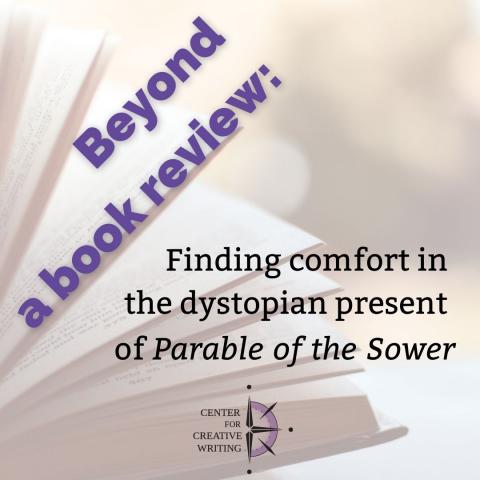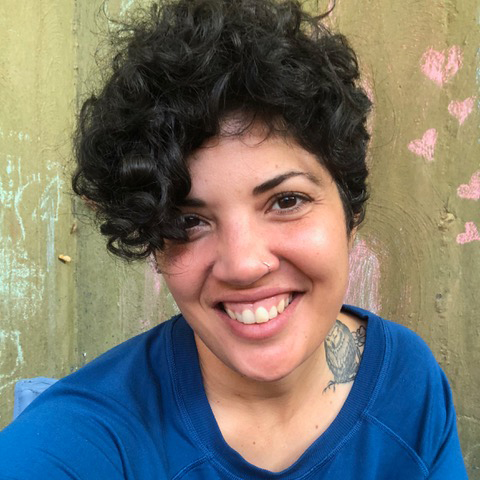
Shawna Ayoub moves "beyond a book review" in not only recommending great books by diverse writers but highlighting a technique to apply to your own writing.
Parable of the Sower, by Octavia Butler
Parable of the Sower, by Black American writer Octavia Butler, explores an alternate future beginning with the election of a new president in 2024. Main character Lauren Olamina can feel the pain of others. When her community is attacked, she leads survivors on a quest across a dystopian landscape in search of safe haven where she can launch the religion she believes in and has named Earthseed. Lauren conceived of this faith system as one in which “God is Change.” Believers of the religion “shape God” through their belief and actions. Her group of survivors grows as she travels North toward Canada. Gradually, she shares what she has written about Earthseed with her companions. Some become believers. Others are cynical.
Comfort books for uncomfortable times
By nurture, I am cynical. I grew up religiously indoctrinated. The idea that there is only One Way that can be good or right is absolutely abhorrent to me. I find that type of religiosity to be weaponized ignorance, often aimed at either colonizing or alienating (and why not both at the same time?) non-Western civilizations and cultures. And not in the name of goodness. This is not a digression. And what I’m saying next is not a detour.
Recently, one of our Center instructors, Jennifer Steil, wrote in her Substack newsletter on the question of how we define “comfort books.” In her essay, she looks at the questions we ask of books, what we expect of them. Steil seeks hope in new stories without requiring them to be optimistic.
Parable of the Sower isn’t exactly optimistic. And it isn’t new to me. In fact, it’s likely known to you. But just in case, here we are. Butler is a staple of speculative fiction, and her work has helped define the genre. It has also proven generative to thought in various fields, mostly notably social justice and climate change. Coming back to this book as the U.S. faced the conclusion of a highly divisive elective cycle with parallel topics of racism, sexism, and climate debate made this work prescient. I wanted the horror of it to validate my reality. I wanted the comfort of Earthseed to ease my meager spirituality. I wanted the familiarity of it to allow me to not look too hard. Soft eyes can also find meaning.
A writing exercise
After I read it, I had a bit of a breakthrough. I was able to not look too hard at some other areas of my life I’ve been avoiding seeing altogether. And that got me wondering more about when and how we can give ourselves comfort while still forging ahead.
Consider the following: Is there a topic you’ve been avoiding engaging in writing? What if you only wrote about part of it? The top, the side, a corner?
For 15 minutes, write part of a story you need to tell. Don’t go too deep. This writing might look like a list of pertinent events or details, a report of only the facts, a telling of the happy bits, or a scene that lights you up. This exercise isn’t about avoiding. It’s about setting and honoring boundaries. It might help if you say to yourself, “I’m going to write about X” before you get going in order to keep that goal in mind. This posturing can help you shift the balance of potentially unwelcome details you want to address later by having a more fleshed-out story surrounding those details.
Afterward, as always, take five minutes to record how this exercise felt to you. Did you notice anything in your body? Is there any specific thought you need to come back to?
If this book sounds intriguing to you, consider purchasing your own copy of Parable of the Sower at Bookshop.org and supporting independent bookstores across the U.S.
Related reading
Beyond a Book Review: Our Wives Under the Sea, by Julia Armfield
Beyond a Book Review: Reality as horror in Out There Screaming
Beyond a Book Review: Risking it all in Fault
Beyond a Book Review: Writing other languages in Vampires of El Norte
Beyond a Book Review: Uncertain futures in How High We Go in the Dark
Beyond a Book Review: Sentences as paragraphs in The Last White Man
Beyond a Book Review: Alternate futures in Womb City
Beyond a Book Review: Beginning at the End in Tomb Sweeping
Beyond a Book Review: The “What if?” of The Deep Sky
Beyond a Book Review: Grief and Hope in All We Are Told Not to Touch
Beyond a Book Review: Once Upon a Time in Dovelion
Beyond a Book Review: Narrators and Compassion in Finding La Negrita
Beyond a Book Review: Research as Connection in Through the Banks of the Red Cedar
Beyond a Book Review: Intuition in River Woman, River Demon
Beyond a Book Review: Timeline(s) in Becoming AppalAsian
Beyond a Book Review: Unwieldy Creatures and retelling our stories
Beyond a Book Review: Containers as safe spaces in Nonwhite and Woman
Beyond a Book Review: Footnotes in Belly to the Brutal
Want to receive prompts, tips, and inspiration like this in your inbox every Sunday morning? Join our email list community! You will receive weekly advice, a year’s worth of weekly writing prompts as a FREE download, and be eligible to participate in our monthly photo prompt contest for a chance to share an original piece of writing with our community of more than 2,500 writers.
